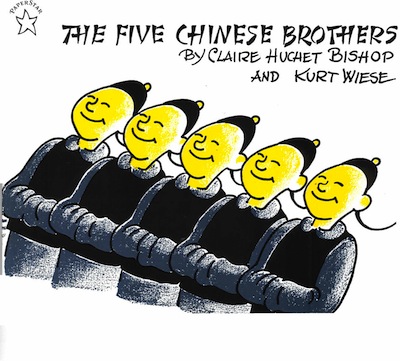 I have no problem with a politically incorrect classic. Babar may be a colonialist, but he’s dear to my heart. And the only thing stopping me from buying my own copy of Richard Scarry’s original Busy, Busy World (1965) — starring the garrulous Patrick Pig from Ireland and the Israeli wife who wouldn’t stop nagging her husband — is that an unexpurgated edition can cost upwards of $300.
I have no problem with a politically incorrect classic. Babar may be a colonialist, but he’s dear to my heart. And the only thing stopping me from buying my own copy of Richard Scarry’s original Busy, Busy World (1965) — starring the garrulous Patrick Pig from Ireland and the Israeli wife who wouldn’t stop nagging her husband — is that an unexpurgated edition can cost upwards of $300.
I remember sitting on a rug with the rest of my kindergarden class enthralled by the strange, dark folk tale of five brothers who manage to outwit the authorities when one of the siblings is wrongly sentenced to death. The Five Chinese Brothers by Claire Huchet Bishop (1938) may have depicted my fellow Asians as vengeful and slanty-eyed but that didn’t rattle me. The brothers had alluring superhuman abilities: “The First Chinese Brother could swallow the sea. The Second Chinese Brother had an iron neck. The Third Chinese Brother could stretch and stretch his legs. The Fourth Chinese Brother could not be burned. And the Fifth Chinese Brother could hold his breath indefinitely.”
But on re-reading this book here’s what you realize. The Five Chinese Brothers is absolutely baffling. I still don’t have a huge problem with it being un-P.C. It’s more that it inevitably raises some questions, such as:
1) “How could you kill someone with whipped cream?”
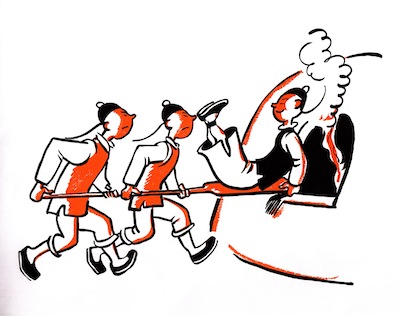 To a kid, being plopped into a container of whipped cream sounds like heaven. Besides that, when the oven is turned on wouldn’t the fluffy cream turn to liquid? (Not to mention my own question — when were the ancient Chinese even eating whipped cream?)
To a kid, being plopped into a container of whipped cream sounds like heaven. Besides that, when the oven is turned on wouldn’t the fluffy cream turn to liquid? (Not to mention my own question — when were the ancient Chinese even eating whipped cream?)
2) “Why were the people so angry each time a Chinese Brother didn’t die?”
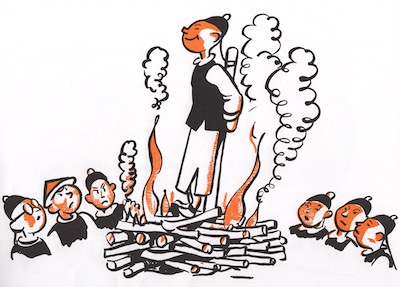 Hard to answer without getting involved in a discussion of mob psychology and the public thirst for bloody spectacles.
Hard to answer without getting involved in a discussion of mob psychology and the public thirst for bloody spectacles.
3) “How come if they couldn’t kill the Brother that meant he was innocent?”
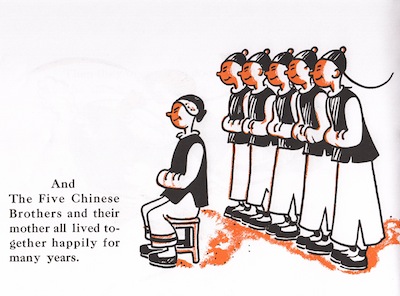 This is biggest doozy of them all. When all the executions fail, the judge decides it means that their prisoner must not be guilty! Truly, it is beyond all logic.
This is biggest doozy of them all. When all the executions fail, the judge decides it means that their prisoner must not be guilty! Truly, it is beyond all logic.
My kids liked The Five Chinese Brothers well enough, but it didn’t seem to make much of an impression either way. In fact, my daughter has since discovered Kathy Tucker’s The Seven Chinese Sisters (2003), which she likes much more. The book (with illustrations by Grace Lin) is also about a Chinese family with preternatural powers, but it’s not a watered-down retelling of the Five Chinese Brothers. The story involves a dragon, a kidnapping, and a noodle soup. Check it out.

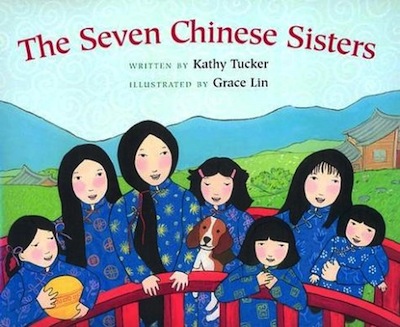
I am quite certain that when I read this book as a child, there was no mention of whipped cream in the oven. Clearly, the illustrations show smoke. I have tried investigating it, but I can not find an original 1938 copy. I am wondering if at some point, someone decided to “tone down” the demise of the fifth brother, and figured that the smoke in the illustration could be explained as being whipped cream.
I, too, have no memory of said whipped cream. Though I read the book in 1957, give or take a year or two, I would have remembered that. Everything made sense to me, inasmuch as anything else about superpowers can make sense. Would not the brothers’ very survival of execution attempts dictate, if not codified in an ancient law, that a supreme entity existed that was angry at the attempt to execute an innocent man? One thing was certainly clear to me. I was amazed and very happy for the brother’s. My imagination ran wild with the thought of the whole ocean being held in the guy’s mouth and the illustration (I think there was an illustration) of the ocean floor. Dr. Seuss’ “The 5000 Hats of Bartholomew Cubbins” made no sense, either – loved it!